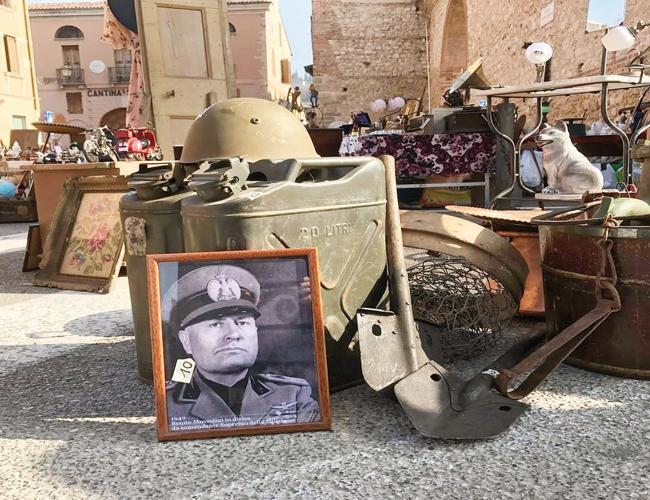
When hundreds of hardcore fans of Italy’s Hellas Verona Seria A football club chanted “Adolf Hitler is my friend” and sang that their team embraced the swastika, at a festive gathering in the summer, Italian Jewish communities complained - and waited.
Local officials initially dismissed the video as a “prank,” and condemnation only came several months later, after another video from the same event, profaning Christian objects, also began circulating on social media.
“These episodes should absolutely not be dismissed,” said Bruno Carmi, the head of Verona’s tiny Jewish community of about 100, speaking in an interview at the Verona synagogue, which is flanked by two armed police patrols. “In my opinion, whoever draws a simple swastika on the wall knows what it means. And we know very well where that swastika brought us.”
Racist and anti-Semitic expressions have been growing more bold and violent in Italy. Anti-migrant rhetoric is playing an unprecedented role in shaping the campaign for the March 4 national elections, which many says is worsening tensions and even encouraging violence.
Hate crimes motivated by racial or religious bias in Italy rose more than 10-fold, from 71 incidents in 2012 to 803 in 2016, according to police statistics. The five-year period corresponded with an explosion in migrant arrivals.
On Feb. 3, a right-wing extremist shot and wounded six African immigrants in the small central Italian city of Macerata.
Police say the suspect claims to have been acting out of revenge after a Nigerian migrant was accused of dismembering an 18-year-old whose remains were found three days earlier. The shooting drew widespread, but not universal, condemnation.
The attack also had a political taint. The alleged gunman, Luca Traini, was a failed candidate for the right-wing, anti-migrant Northern League last year and had previously flirted with more extreme neo-fascist movements.
Police seized Nazi and white supremacist propaganda from his bedroom. The night before the shooting, Northern League leader Matteo Salvini had cited the teen’s murder in a campaign appearance in Verona, pledging to send home 150,000 migrants if elected. He only dug in further after the attack.
Former Premier Silvio Berlusconi, who is competing with Salvini for leadership of the center-right coalition, significantly upped the political ante after the shooting. He claimed that 600,000 migrants were in Italy illegally, calling them “a social bomb ready to explode because they are ready to commit crimes,” and threatened to deport many.
“The facts of Macerata in some ways show that in recent years there has been a process of cultural, social and political legitimization of racism that is creating enormous damage, most of all at the expense of people’s lives,” said Grazia Naletto, president of Lunaria, a Rome-based non-governmental agency that compiles a database of racist incidents in Italy.
Lunaria counts 84 cases of racist violence against individuals in the last three years, including 11 racially motivated murders, a statistic that Naletto called unprecedented in Italy.
Poll shows xenophobia
A report on hate for the Italian parliament last summer reported that 40 percent of Italians believe other religions pose a threat, especially the Muslim faith.
It also said anti-Semitism is shared by one in five Italians. The IPSOS MORI polling company found that Italy is the least informed country in the world regarding immigration, with most people overestimating by more than three times the number of immigrants living in Italy.
Findings by the SWG research institute based in Trieste published in January said the demographic most vulnerable to neo-Nazi ideals are those aged 25-34, and that among Italians overall, 55 percent of those in the lowest income range either indulge in or oppose combating neo-Nazi and neo-fascist ideals.
Experts cite many reasons for the spread of extremism and racist expressions that until recently were mostly relegated to the margins of society.
They include a superficial understanding of history, as well as an economy weakened by a long crisis that sidelined many ordinary workers and barred many young people from entering the work force.